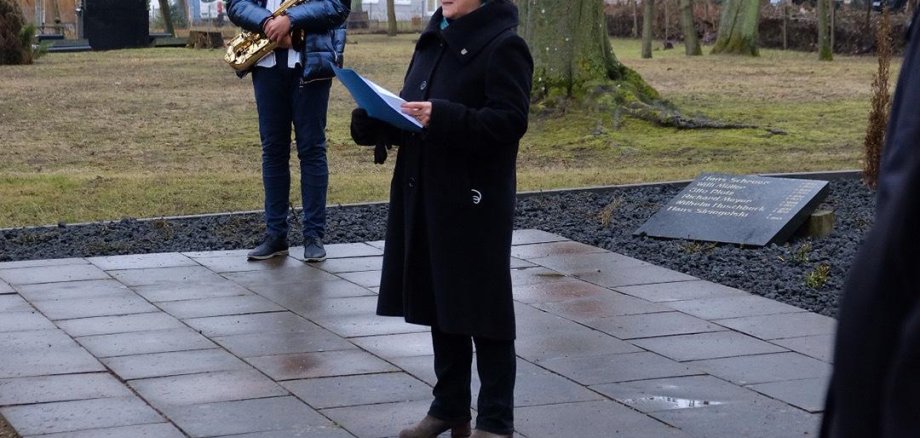Together with around 30 guests, the mayor of the municipality of Rüdersdorf near Berlin commemorated the victims of National Socialism at the memorial at the colonists' cemetery in the Rüdersdorf district.
The event was accompanied by music from Ilja Ananyin and the poem "In Exile" by Mascha Keléko, recited by Renate Radoy, as well as an introduction to the writer's life.
Speech by Mayor Sabine Löser:
"Dear Ladies and Gentlemen,
dear guests,
77 years ago today, the Auschwitz concentration camp was liberated by the Red Army. Both there and at the liberation of other camps by the Allies, hard-boiled soldiers were seen crying. Even today, when they speak for documentaries, they often find it difficult to hold back their tears in the face of the horror they witnessed.
Industrial mass murder by the millions after people were categorised as worthy of life and not worthy of life.
A few days ago, the Wannsee Conference marked its 80th anniversary. High-ranking representatives of the Nazi regime met to coordinate how the murder of European Jews should be implemented as efficiently as possible at the official level. The systematic murder had already been decided by the Nazi leadership and was in full swing. The meeting was convened to facilitate coordination and harmonisation between the authorities during the mass extermination. Together, they discussed how the killings could be organised more effectively than the shootings that had been common up to that point. How deportations could be better organised - mass murder became an administrative act and was systematically planned.
Shortly afterwards, the first gas chambers were built in Auschwitz, and from March 1942 the first mass transports of Jews arrived, who were sent directly to the gas chamber. In addition to Jews, people with mental and physical disabilities or mental illnesses, homosexuals and Sinti and Roma were discriminated against, persecuted and murdered.
Millions of people were deported from their homeland and sent to their deaths.
In her poem "In Exile", published in 1945, the Jewish writer Mascha Keléko addresses the feeling of losing her homeland:
"I once had a beautiful fatherland -
so sang the refugee Heine.
His stood on the Rhine,
mine on Brandenburg sand.
We all once had one (see above!).
That was eaten by the plague, that was destroyed in the fall.
Olittle rose on the heath,
you were broken by the joy of strength.
The nightingales became silent,
lookedaround for a safe place to live,
and only the vultures scream
high above rows of graves.
It will never be the same again,
even if it changes.
Even if the dear little bell rings,
even if no sword clangs any more.
I sometimes feel as if
my heart is breaking.
I'm homesick sometimes.
I just don't know what for."
In her speech to the German Bundestag one year ago today, Holocaust survivor and former President of the Central Council of Jews, Charlotte Knobloch, emphasised that we must not forget for one day how "fragile the precious achievements of the last 76 years" are. According to Knobloch, we can be proud of the "young people in our country" who are free of guilt when it comes to the past. "But they are taking responsibility for today and tomorrow - with interest, passion and courage."
And when I see that here, in the centre of our community, signs have recently been put up after so-called walks comparing police officers with concentration camp guards from 1945, I find this disgusting and oblivious to history. I would like to quote Charlotte Knobloch once again: "Anyone who compares the coronavirus measures with Nazi Jewish policy is trivialising the anti-Semitic state terror and the Shoah. That is unacceptable!"
And so we must remind ourselves again and again that our history does not protect us from new and old forms of racism, anti-Semitism or other inhumane views. It is our duty to be vigilant and to oppose these excesses with the utmost determination. The enemies of our democracy are looking for their platform and their cause to attempt to divide us. Be it refugees, corona measures or whatever the occasion. Let's stand together and debate hard on the matter, but let's not forget where the boundaries are and where we are leaving the basis of democratic consensus in our country."

